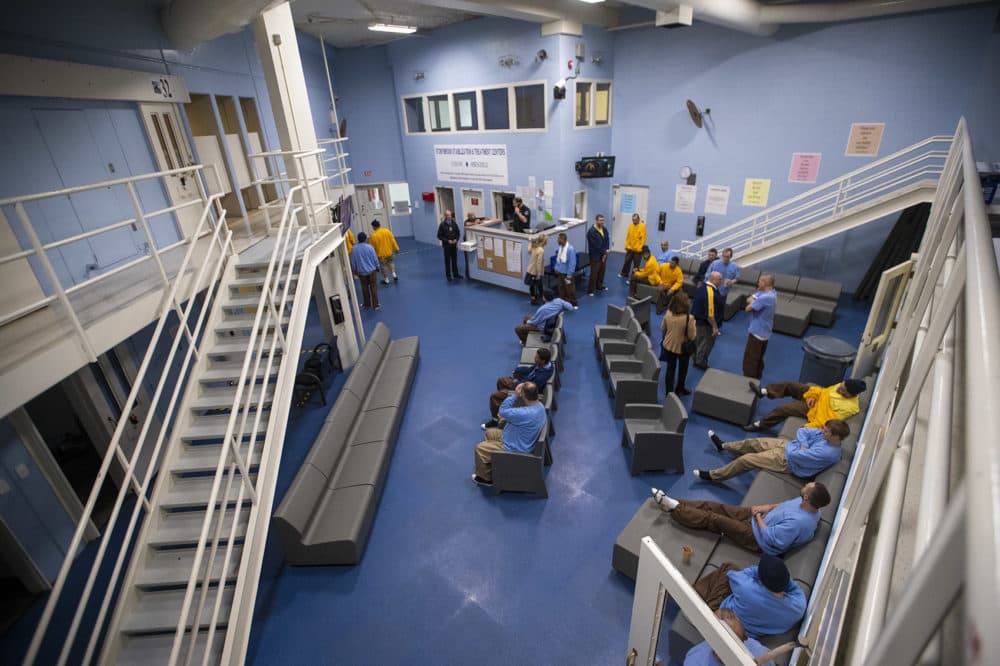Advertisement
Commission Weighs Possible Changes For Section 35 Law
Resume
There will likely be some changes to Massachusetts's controversial practice of sending people to jails and prisons for forced addiction treatment.
The state Section 35 Commission, named after the law that allows civil commitments, held its final meeting Thursday and drafted several recommendations.
Most members approved a draft recommendation that would bar the state from sending people to criminal justice facilities for treatment — but the debate over that will likely continue.
During its seven months of meetings, the commission heard from health care workers, court personnel, law enforcement, the ACLU and some of those who've been through the civil commitment process. Joel Kergaravat, 36, was sent to MASAC, the Massachusetts Alcohol and Substance Abuse Center at Plymouth. In December, he told the commission that he was traumatized there.
"There were brutal fist fights for five minutes before guards would break it up. You'd see blood, hear screaming, see people hurt," Kergaravat said.
MASAC is a minimum security prison that has more than 250 Section 35 beds after Gov. Charlie Baker's 2017 decision to add space there for men who are civilly committed, and is overseen by the state Department of Correction.
This route to addiction treatment through the criminal justice system — which is unusual in most states — was a main focus of the commission. Currently, if a judge determines that someone's substance use is a danger, that person can be forced into treatment for up to 90 days.
Because the majority of men's Section 35 beds are in jails and prisons, that's where most civilly committed men end up going. The commission's recommendation could boost legislation co-sponsored by state Rep. Ruth Balser, who's also on the Section 35 Commission. Her bill would change the civil commitment process for men.
"The commission recommendation essentially supports the legislation I've filed, which would prohibit sending civilly committed men to treatment facilities overseen by correction institutions. People with addiction are sick, they're not criminals. So I'm very glad the commission reached that conclusion," Balser said.
At a legislative briefing on Balser's bill this week, Robin Wallace of Cape Cod told a story she shared with WBUR earlier this year about her son. Wallace believes her son Sean was so traumatized by his Section 35 commitment in Plymouth that he ended up taking his own life.
"Prisons are not addiction treatment centers. To be put in a prison atmosphere without having committed a crime is unjust," Wallace said as the audience erupted in applause.
Many parents told the commission that a locked secure facility saved their child's life. But half of the respondents in a recent WBUR poll said they strongly oppose sending people to jails and prisons for treatment.
The debate will likely continue, if the Balser briefing is any indication. Teresa Finnegan, general counsel for the Hampden County Sheriff, talked about the men's Section 35 wing that the sheriff opened in the Hampden County jail last year. She says that facility is different from Plymouth and is needed in that part of the state.
"There's nothing in western Massachusetts. We have the infrastructure. We treat addiction every single day. Our people don't need to travel across the state for treatment anymore," Finnegan said.
But Balser says she's committed to getting treatment out of corrections. She says she would not support the idea to amend her legislation to allow the sheriff's program to continue.
"I would not be interested in changing the legislation," Balser said. "I do recognize that the people at the Hampden County facility are being treated better but it's still a criminal justice facility and not a health care facility. "
Another thing that could affect the Hampden County program is a lawsuit charging the state with discrimination because it stopped sending civilly committed women to prison three years ago after a different lawsuit.
Because of the litigation, some commissioners, such as Health and Human Services Secretary Marylou Sudders, could not vote on the recommendations. But Sudders did say she hopes the commission's work will result in more and improved treatment.
"There is clearly interest in continuing the pathways of expanding access to treatment and the role of involuntary commit[ment] is a piece of that for some," Sudders said.
The 29-member commission was created last year after Baker proposed allowing doctors to hold people for up to 72 hours if their substance use is deemed dangerous. The Legislature rejected that last year and the commission voted against it in a draft recommendation as well.
Part of the commission's charge was to look at the efficacy of forced treatment, but it found that that's a question that hasn't been answered. So the commission's draft recommendation acknowledges the research is scant and it wants more study and a look at outcomes. Joel Kergaravat asked that question back in December when he told the commission about his civil commitment.
"In the absence of soft of tangible data, they need to ask what evidence do we have that supports our theory that this works? Or are we just doing something to say that we're doing something?" he asked.
The commission members have until Sunday at 5 p.m. to finalize their recommendations before they go to lawmakers on Monday.
This segment aired on June 28, 2019.
